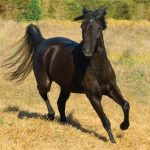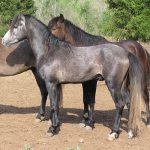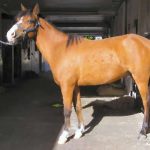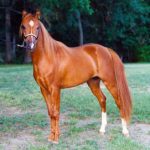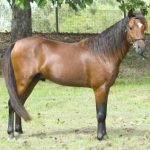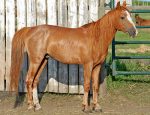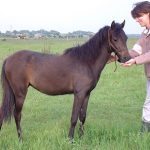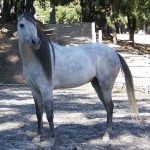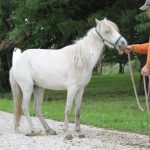Caspian Horse
The Caspian Horse is a breed of relatively small, primitive equines that dates back even the Arabian horse breed. They were presumed to have been extinct until they were rediscovered in the 1960s. Interestingly, these animals can even be handled by children, and are primarily used as cart ponies. They are known for their speed and the ability to carry heavy loads through the narrow streets and crowded places. Because of their fundamental genetic differences, these purebreds have some conformational contrast with many other modern breeds.
Caspian Horse Pictures
- Black Caspian Horse
- Caspian Horse Foal
- Caspian Horse Images
- Caspian Horse Mare
- Caspian Horse Pictures
- Caspian Horse Stallion
- Caspian Horse
- Caspian Horses
- The Caspian Horse
- White Caspian Horse
Quick Information
| Other Names | The Caspian |
| Behavioral Characteristics | Gentle, kind, alert, spirited, adaptable, eager, friendly |
| Physical Traits | The stature is relatively short, with a small skull having a vaulted forehead; the coat is fine and thin, while the neck is long and arched and the shoulders are sloped; the hindquarters are muscular and proportionate with tough hooves; the mane and the high set tail are luxurious and long |
| Coat Colors | Common colors include black, chestnut, gray, and bay; piebald or skewbald (pinto) are not considered in the breed standards |
| Height/Size | 10-12 hands (adult male and female average 11.2) |
| Weight | 1050 pounds |
| Life Expectancy | Around 25 years |
| Common Uses | Dressage, jumping, mounted athletics, racing, pleasure riding, show, harness racing, competition, scurry driving |
| Health Problems | Otherwise a healthy breed, some individuals have been reported to have suffered from laminitis, which often happens from under exercising and overfeeding |
| Type | Sport horse, Show horse, Riding horse |
| Blood Type | Warm |
| Popular Traits | Highly intelligent, multi-talented, easy trainability, adaptable to harness, easy to keep, skilled movements (sure-footed with long low strides) |
| Care | Feeding/Diet: Needs minimum forage; requires little or no grain supplement (minimum supplements high in sugar or carbohydrates is essential) Activities: Needs frequent exercise and attention |
| Country of Origin | Iran (northern part) |
| Time of Origin | Around 3000 BC |
| Associations and Registries | Caspian Horse Society, UK Caspian Horse Society of the Americas |
Video: Celebrating the 50th Rediscovery-Anniversary of the Caspian Horses
History and Development
The Caspian Horse is one of the oldest known horses that have been roaming over planet earth for more than 3000 years and was the royal horse of the Persian Empire. In the development of the modern horse, this breed may represent ‘Horse Type 4’, which makes it the only foundation type that still exists in the contemporary modern era.
There are evidential documents, as well as ancient artworks, about their existence. The Caspian is the oldest known warm-blooded horse and has closely related to the modern day Arabian horses.
Researchers hypothesize that the first Caspian Horses may be the ancestors of all present-day hot blooded breed. Genetically speaking, the Caspian Horse represents the bridge between the primitive equine – Equus and the hot-blooded breeds of the deserts and the plateaus.
Because these animals were never spotted by anyone for many centuries, the horse enthusiasts began to believe that they have long been extinct. However, in 1965, an American horsewoman, Louise Firouz, who visited Iran with her Iranian husband, came across a few short-statured, classic Arabian-looking equines roaming in Amol, a city in the Mazandaran Province close to the southern part of the Caspian Sea. While Firouz was in search of a few horses for her horse-riding children’s school, she selected three of those feral equines and took them to her school. Eventually, she began with breeding these animals and, in the long run, was successful in the gradual re-establishment of the breed. After her demise in 2008, her legacy continues to live on the Caspian breed.
The CHS-UK (‘Caspian Horse Society of the United Kingdom’) was established in 1975, followed by the establishment of its Stud Book in 1978. The CHSA (‘Caspian Horse Society of the Americas’) was formed in 1994. At present, the Caspian Horses are bred in the two Americas, the UK, in New Zealand, and Australia. Presently, this breed is quite available in the United States but is relatively expensive.
Interesting Facts
- The Shah of Iran gifted Prince Philip of England (the husband of Queen Elizabeth II) with a stallion and a mare in 1972.
- Though they are technically considered as a pony, a few clubs and organizations view and treat them like a horse.
- Currently, there are around 2,000 registered Caspian Horses around the world, out of which, about 500 are from the US.


